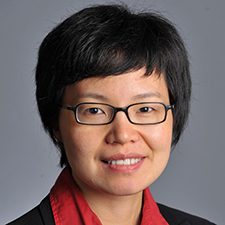EvidenceMap: a three-level knowledge representation for medical evidence computation and comprehension
Authors Chunhua Weng, PhD and Tian Kang, PhD discuss this month’s JAMIA Journal Club selection.
Watch the Recording
Speakers
Dr. Chunhua Weng is a Professor of Biomedical Informatics at Columbia University and an elected fellow of American College of Medical Informatics (ACMI) and International Academy of Health Sciences Informatics (IAHSI). She is also a co-Director for the Biomedical Informatics Resource for the Columbia CTSA (The Irving Institute for Clinical and Translational Research) and an Associate Editor for Journal of Biomedical Informatics. Dr. Weng’s long-term goal is to develop novel informatics methods to support the life cycle of clinical evidence, from evidence generation to evidence retrieval, appraisal, synthesis and dissemination.
Dr. Tian Kang is a former PhD graduate from Dr. Weng’s research lab and a current Machine Learning Scientist working in industry. Her dissertation is entitled “Towards unified medical evidence computation from literature for evidence-based medicine.” This JAMIA publication results from Dr. Kang’s dissertation research.
Manager
Moderator
Statement of Purpose
When it comes to practicing evidence-based medicine, the PICO framework is the most widely adopted model for structuring clinical questions for clinical evidence retrieval. This work goes beyond the PICO entity level and contributes a 3-level computable representation for clinical evidence called EvidenceMap and accompanying annotated corpora and an NLP pipeline.
Target Audience
The target audience for this activity is professionals and students interested in health informatics.
Learning Objectives
After participating in the webinar, attendees should be able to:
- To appreciate the value of a symbolic knowledge representation for clinical evidence
- To appreciate the symbiosis between a knowledge representation and an NLP pipeline for structuring clinical evidence in PubMed
Format
- 35-minute presentation by article author(s) considering salient features of the published study and its potential impact on practice
- 25-minute discussion of questions submitted by listeners via the webinar tools and moderated by JAMIA Student Editorial Board members.
Accreditation Statement
The American Medical Informatics Association is accredited by the Accreditation Council for Continuing Medical Education to provide continuing medical education for physicians.
Commercial Support
No commercial support was received for this activity.
Disclosures for this Activity
The following planners and staff who are in a position to control the content of this activity disclose that they have no financial relationships with commercial interests/ineligible entities:
- Presenter: Chunhua Weng, PhD and Tian Kang, PhD
- JAMIA Journal Club Planners: Lu He; Sanya Taneja; Kirk Roberts
- AMIA Staff: Eileen Bailey



